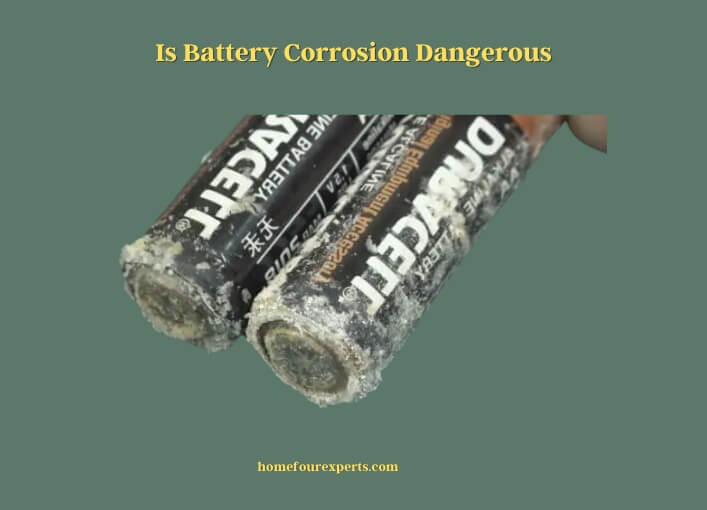When you open a device’s battery compartment, sometimes you’re likely to discover a covered thick layer of corrosive battery acid on the battery. Even though it’s unpleasant, you must use caution when dealing with Corrosion. So you might now be thinking, “is battery corrosion dangerous?”
Well, If battery acid spills into an electronic item, it can ultimately damage it. In addition to polluting the environment, it causes skin and eye irritation and burns. So battery corrosion can be sometimes dangerous if not handled carefully.

Generally, the battery voltage drops when it discharges or has Corrosion. Don’t panic cause batteries are safe, but use caution while handling broken cells or working with lead-acid systems that contain lead and sulfuric acid. So, Can battery corrosion make you sick?
Well, Lead-acid has been properly classified as dangerous in several countries, and health risks can arise if the lead is not treated appropriately, so it can make you sick. To make you aware of the dangers of battery corrosion, I’ve described it in full detail here.
What is Battery Corrosion?
Most battery corrosion is caused by a chemical interaction between hydrogen gas produced from the battery acid and metal connections. Corrosion is a typical sign of white or green stains on battery connections. For example, an AA battery intended for a single electrochemical cell will typically show Corrosion on the contacts, which is normal.
The electrodes are always in a reactive state that the lead softens and finally sheds in a lead-acid environment. Batteries go through this, and it’s impossible to get rid of it altogether, and slowing down the process is feasible.
It’s a good idea to know how to calculate battery life so that you can prepare ahead of time before Corrosion occurs. It takes a standard 9-volt battery of more than five years to last in storage before Corrosion occurs than the standard AA, AAA, C, and D cells, which last more than 10 years.
What is Battery Acid?
The term “battery acid” can refer to any acid used in a chemical cell or battery, although it is most generally used to describe the acid found in lead-acid batteries, such as those found in automobiles.
Soluble sulfuric acid or H2SO4 comprises 30 to 50 percent of automobile battery acid (BA) solution (W). As a general rule, sulfuric acid has a mole fraction of 29 to 32 percent sulfuric acid, a density of 1.25 to 1.28 L, and an acid concentration of 4.25 to 5 mol/L. The PH of battery acid is roughly 0.8. It’s possible to ask the question, “Is battery corrosion dangerous to touch?” because it contains a variety of chemicals.
Battery Acid Types
A skin reaction can occur if battery acid comes into touch with your skin, leading to chemical burns. When compared to thermal burns generated by fire or heat, battery burns can quickly disintegrate your skin. The following are the two kinds of battery acid you might encounter:
Batteries for the Household Appliances
Alkaline batteries are commonly used in household appliances. Potassium hydroxide is released when these batteries degrade. It is possible to safely neutralize and properly clean these compounds despite the potential for chemical burns.
Batteries for Your Car
Lead-acid batteries used in automobiles typically contain sulfuric acid in addition to the regular lead-acid. Batteries with sulphur in them are corrosive. Some acne and skin disorders can be treated with diluted sulphur. However, battery acid’s sulphur isn’t bland enough to be safe on the skin. If lead-acid batteries come into touch with your skin, you may need medical assistance right away.
Why Corrosion Is Dangerous to Batteries: Understanding Basic Battery Metals
In batteries, sulphuric acid, Lead, Cadmium, Nickel, and other metals are found. If an accident occurs, it will have a different effect on our skin. The metals used in battery manufacturing are listed below.
Sulfuric Acid
Sulfuric acid is more corrosive and hazardous than other battery acids found in lead-acid batteries. Eye contact can result in blindness, and swallowing can harm or kill internal organs. Water flushing for 10-15 minutes will cool the damaged tissue and avoid subsequent harm. Remove contaminated garments and thoroughly rinse skin. Wear protective gear when handling sulfuric acid.
Lead-stem
Lead is a poisonous metal that enters the body by inhalation or contact with lead-contaminated hands. When acid and lead particles reach the soil, they damage the soil and dry out, causing air pollution. Exposure to lead is most likely to occur during childhood and pregnancy. Lead poisoning can stunt a child’s growth, harm the brain & kidneys, cause behavioral issues, and even cause death.
Lead causes memory loss, focus issues, and reproductive system harm in adults. Hypertension, neurological diseases, and muscular and joint pain have led. Beethoven may have died from lead poisoning, according to researchers.
Cadmium-Copper
In Japan, long-term exposure to metals causes health problems for workers in nickel-cadmium manufacturers, and the government has forbidden nickel-cadmium batteries from being disposed of in landfills. The kidneys might be damaged by a soil metal that is soft and white in color. Touching the side that comes into contact with the skin will absorb Cadmium.
Nickel Metal
The electrolyte is the only concern with nickel-metal hydride. Nickel is poisonous to plants but not to people. Ions of lithium are likewise harmless, and the battery is non-toxic. However, damaged batteries must be handled with caution. Avoid touching your mouth, nose, or eyes when handling a spilled battery.
How to Clean Alkaline Battery Corrosion
Users often ask me-Is baking soda and vinegar are good for removing battery corrosion? In fact, using this duo is one of the most effective ways to permanently end battery deterioration. The following five simple methods can help you clean and avoid battery corrosion.
To clean the battery compartment, you’ll need the following supplies:
- Lemon or white vinegar;
- Baking soda;
- Eye goggles;
- a toothbrush;
- Gloves;
- Cotton swabs.
Step 1.
Prepare a homemade battery cleanser. It’s quick and easy to make. Stir 1 tbsp baking soda into a glass of water, and it’s ready! Or if you don’t want to go with any hassle, you can use [amazon link=”B002MGTNX0″ title=”NOCO Battery Terminal Cleaner Spray And Corrosion Cleaner” /].
Step 2.
Disconnect the battery and check that the gadget is off. Open the cover and detach the battery’s negative and positive connections. Battery accumulation, Corrosion, and dirt on the terminals can adversely impact efficiency.
Step 3.
Start rubbing with a detergent-soaked toothbrush! Rub with tongs an old toothbrush dipped in baking soda. Clean the terminal until all Corrosion is gone.
Step 4.
Rinse and dry extra water. After cleaning the contacts of rust and dirt, flush the battery fast. Fill the spray with water and spritz the joint. If no spray is available, use a wet towel to remove the grime. Dry the tongs well with another cloth.
Step 5.
Connect the wires with Vaseline. Apply petroleum jelly on the dried terminal. In addition to destroying it, it strengthens the joint. You’re done!
Also, knowing how to clean battery acid is beneficial if the gadget has alkaline leaks in any case. Pour vinegar or lemon juice on persistent leaks and use an old toothbrush to clean.
Tips for Keeping Batteries Safe
Maintaining alkaline batteries will lessen the need to clean Corrosion. Below are a few tips that keep Corrosion away-
1. Remove the batteries if you plan to store the device for long. So if the batteries leak, the electronic equipment isn’t harmed.
2. Remove the batteries while the device is plugged in with an adaptor.
3. Never store batteries in a hot or cold environment. Batteries don’t last long in the fridge, and this shortens the battery’s life and increases the risk of leakage.
4. When recharging a device, check sure the batteries are the same size. Keep old and new batteries separate. Also, make sure they’re identical.
5. When changing batteries, use an eraser to wipe the new battery and the device’s connectors. This maximizes contact.
FAQs
Can Battery Corrosion Affect the Longevity of a 12 Volt Fridge’s Battery Life?
Yes, battery corrosion can significantly impact the 12 volt fridge battery lifespan. Corrosion can lead to poor electrical connection, voltage drops, and ultimately, reduced battery capacity. To ensure a longer lifespan for your 12 volt fridge battery, it’s important to regularly check for and clean any signs of corrosion.
1. Is Car Battery Corrosion Dangerous to Touch?
Battery corrosion is poisonous and dangerous. So you must handle it with care because touching rust with bare hands might cause irritation.
2. Is It Bad to Inhale Battery Corrosion?
Yes, Sulfuric acid exposure can cause difficulties breathing and chest discomfort. Any form of battery acid vapors can be hazardous and cause nausea or dizziness.
3. Is It Safe to Use Something With Battery Corrosion?
No, it’s not a wise idea to use a battery with Corrosion because it can damage the device as well as your health. So it’s ideal for neutralizing it using a household acid.
4. Is It Necessary to Replace a Corroded Battery?
No, first, Clean the Corrosion and apply a protective oil or washer. If Corrosion persists even after a few days or weeks, it’s time to consider getting a new battery.
5. Is Corrosion on a Battery a Sign That It’s in Poor Condition?
Corrosion is frequently associated with a failing battery with terminal difficulties. If you observe that the battery is corroding, it is a clue that it is faulty.
Final Thought
Leaking potassium hydroxide from batteries is a very caustic and hazardous substance. The corrosive material in batteries can cause skin irritation and eye damage, which should reassure anyone wondering, “is battery corrosion dangerous?” Hope this information can help prevent a further accident that you have now acknowledged.
Respiratory issues can also be caused by it. When cleaning batteries, be sure to follow the safety measures at all times and use protective gear, including gloves, a face mask, and goggles.
About This Writer

Hi, I am responsible for the 'Homeowners Power Solutions' category. My name is Liam Jaxon and a licensed technician with 7 years of experience in vehicle batteries, electrical gadgets, and home appliances. My working experience in different residential & light commercial electrical sectors and the automobile industry helped to acquire vast knowledge in this industry.